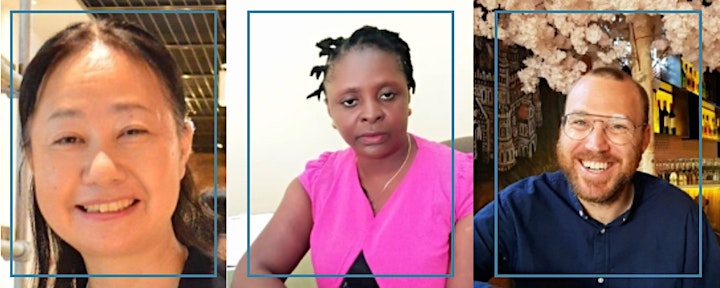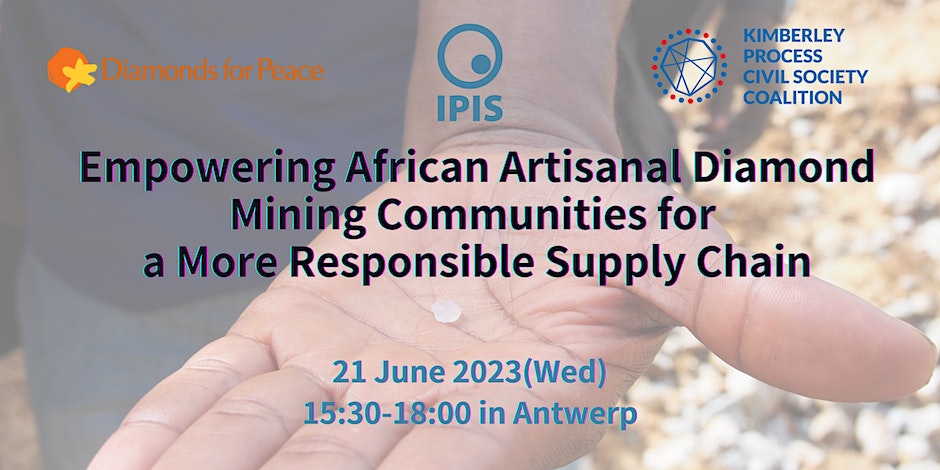IPIS and Diamonds for Peace invite you to a panel discussion on Wednesday 21st June 2023 in Antwerp.
Panelists will share their experiences of working with artisanal diamond mining communities and views on how to include artisanal miners for a more responsible diamond supply chain. Speakers will then answer questions from the audience.
Date: Wednesday 21st June 2023
Time: 15:30-17:00 followed by drinks
Location: International Peace Information Service (IPIS)
Italiëlei 98a, 2000 Antwerp, Belgium
Program
15:30 – 15:40 Welcome remarks by Chie Murakami and Filip Reyniers, IPIS director
15:40 – 16:40: Panel discussion
“Empowering African artisanal diamond mining communities for a more responsible supply chain”
• Chie Murakami, Founder and Executive Director for Diamonds for Peace
• Esther Finda Kandeh, Director of Women on Mining and Extractives (WoME) Sierra Leone and member of the Kimberley Process Civil Society Coalition.
• Hans Merket, Researcher at IPIS

16:40 – 17:00: Discussion with the audience
17:00 – 18:00: Drinks to exchange further
More on the panelists
Chie Murakami is the founder and executive director for Diamonds for Peace.After getting her master’s degree in international development, she has worked in Haiti, Laos, and Kenya in the field of international development. She also has experiences in the private sector in Japan. She was shocked to learn various problems in the diamond industry when she got engaged and interests in diamond. She founded Diamonds for Peace in 2014 and directs all the projects and activities implemented by the organization.
Esther Finda Kandeh is the founder and executive director of Women on Mining and Extractives (WoME) Sierra Leone and member of the Kimberley Process Civil Society Coalition. Esther is a long-standing female activist with considerable knowledge and experiences in the extractive sector. Within her organization, she advocates for the space, benefits and wellbeing of women and young people in mining communities in Sierra Leone. She actively engages in multi stakeholder dialogues to contribute to improved policies in the extractive sector in Sierra Leone and beyond.
Hans Merket is a researcher focusing on the link between natural resources and conflict, development and human rights. Hans has among others worked on a grass-roots monitoring pilot for artisanal gold mining in Eastern Democratic Republic of Congo, on the human rights impact of small and large-scale mining in Tanzania and on monitoring the impact of mining companies on adjacent communities. Since 2018, he has been looking more closely at diamonds and the Kimberley Process (KP), both as a researcher and as part of the KP Civil Society Coalition, of which IPIS is a member organization. Hans holds a PhD in law from Ghent University, with a dissertation on the European Union and the security-development nexus.
About the organisations
Diamonds for Peace is a non-profit organization based in Japan and working towards the world in which diamonds are mined, cut and produced with humanitarian and environmental considerations. DFP has been working with artisanal diamond miners in Liberia, West Africa, to promote their self-reliance and to develop a model of mine to market traceable diamonds.
The International Peace Information Service (IPIS) is an independent research institute providing tailored information, analysis, policy advice and capacity enhancement to support those actors who want to realize a vision of durable peace, sustainable development and the fulfillment of human rights.
The Kimberley Process Civil Society Coalition (KP CSC) is the umbrella organization that acts as an observer of the Kimberley Process on behalf of civil society. The majority of KP CSC members are from diamond producing countries in Africa and represent mining communities.
Women on Mining and Extractives (WoME) is a Sierra Leone NGO working with women and young people in mining communities to raise awareness, build capacity and advocate on human rights. In a country where women are not considered to be part of decision-making processes and benefit very little from mining activities, WOME organizes women, builds their confidence to ask questions and advocate for themselves.


